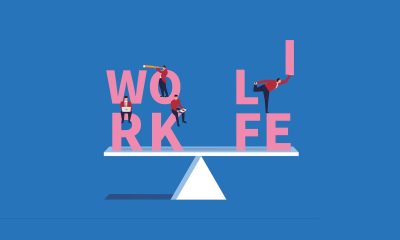Personal Finance
40% of Americans forced into early retirement: survey

A growing number of Americans are being forced into retirement, according to a recent Edward Jones survey.
Roughly 40% of Americans said they were forced into retirement, according to the survey. But 98% of those surveyed said preparation and planning are two critical ingredients for a successful retirement.
Workers in the U.S. generally retire at around age 61, so a forced, early retirement could shave years off savings potential, and may derail a well-laid-out retirement plan, according to Citizens Bank. Some reasons Americans have been forced to retire earlier than planned include health problems, job loss or an outdated skill set.
Being forced into early retirement can be incredibly challenging if the saving plan also relies on Social Security income. While Americans can draw on Social Security as early as the age of 62, full benefits are paid at the age of 67, according to the Social Security Administration.
“Retirement is often full of unforeseen challenges,” Jennifer Schoonmaker-Dasch, an Edward Jones financial advisor in Lexington, North Carolina, said. “Whether it be an involuntary termination or health challenge, the timing of their retirement can be an unexpected challenge itself.”
If you are trying to plan for retirement, paying down debt can put you in a better position financially, and a personal loan could help. Visit Credible to compare multiple lenders at once and choose the one with the best interest rate for you.
COST IS THE BIGGEST FACTOR BEHIND WHY A MAJORITY OF AMERICANS DELAY MEDICAL CARE: SURVEY
Some retirees should consider a return to the workforce
Most (98%) financial advisors said “preparation, flexibility, and willingness to adapt” are essential to building a successful retirement, according to Edward Jones.
The biggest problems that Americans said they encountered with retiring early were dealing with costs that arose from unexpected needs, the survey said. The biggest financial shocks came from inflation and increasing costs, providing financial assistance for family and friends, and needing to make up for declining investments.
Developing a strategy to deal with these challenges could include a return to the workforce, the survey said. Ninety-four percent of financial advisors say they have discussed or would like to discuss deciding how or if their clients should return to work after retiring.
“More and more, we are having conversations with our clients about whether working in retirement might be right for them,” Schoonmaker-Dasch said. “Working in retirement may look different for individuals than it did in the peak of their careers, but the right employment opportunity can help provide financial stability and give retirees a sense of purpose.”
If you are preparing for your retirement, you could consider using a personal loan to help you pay off debt at a lower interest rate, saving you money each month. Visit Credible to find your personalized interest rate without affecting your credit score.
MAJORITY OF HOMEBUYERS SAY THEY HAVE REGRETS: SURVEY
Americans said they need more than a million for a comfortable retirement
Americans said that $1,100,000 is the target number for a comfortable retirement, yet, only 21% expected to have enough saved, according to the Schroders 2023 U.S. Retirement survey.
Many Americans worried whether their workplace plans, like a 401k, would be enough to reach the target amount for a comfortable retirement, the survey said. Almost half (48%) of working millennials and 50% of older workers with a workplace retirement plan said the performance of their plan in 2022 caused them anxiety.
Additionally, 64% of working millennials and 62% of older workers with workplace retirement plans are concerned they won’t be able to grow their workplace retirement plan assets to the level they hoped to achieve. Yet, more than half (59%) of working millennials and 65% of older workers said they did not change their asset allocation in those plans in 2022.
“Given the performance of stocks and bonds last year, it’s not surprising that fear of losing money heavily influenced asset allocations, but cash shouldn’t be king, especially for millennials saving for retirement,” Schroders’ Head of Strategic Partnerships Joel Schiffman said. “Even the oldest millennial will have decades to ride out any short-term market volatility. With this long-term time horizon in mind, the benefits of working with a financial advisor to create a suitable asset allocation strategy that isn’t dictated by bouts of market volatility can’t be emphasized enough.”
If high-interest debt is preventing you from saving more for retirement, consider paying it off with a personal loan at a lower interest rate. Visit Credible to get your personalized rate in minutes without affecting your credit score.
MOST SENIORS REGRET RETIREMENT PLANNING DECISIONS, WANT DO-OVER: SURVEY
Have a finance-related question, but don’t know who to ask? Email The Credible Money Expert at moneyexpert@credible.com and your question might be answered by Credible in our Money Expert column.
Read the full article here

-

 Side Hustles6 days ago
Side Hustles6 days agoHow to Create a Unique Value Proposition (With Tips & Examples)
-

 Side Hustles6 days ago
Side Hustles6 days agoThe DOJ Reportedly Wants Google to Sell Its Chrome Browser
-

 Investing5 days ago
Investing5 days agoAre You Missing These Hidden Warning Signs When Hiring?
-

 Make Money5 days ago
Make Money5 days ago7 Common Things You Should Never Buy New
-

 Investing7 days ago
Investing7 days agoThis Founder Turned a Hangover Cure into Millions
-

 Investing2 days ago
Investing2 days agoThis All-Access Pass to Learning Is Now $20 for Black Friday
-

 Side Hustles3 days ago
Side Hustles3 days agoApple Prepares a New AI-Powered Siri to Compete With ChatGPT
-

 Passive Income2 days ago
Passive Income2 days agoHow to Create a Routine That Balances Rest and Business Success


















